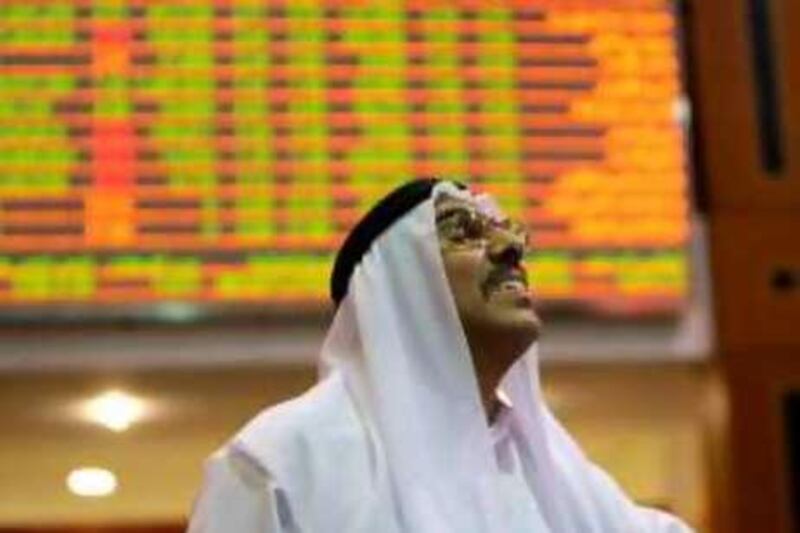Gulf stock markets joined those of much of the rest of the world by rallying yesterday, but the euphoria could be short-lived if foreign investors continue to avoid regional markets. The Saudi Tadawul led the regional pack with a rise of 4.2 per cent. Investors breathed a sigh of relief on the news that the US Treasury had stepped in to nationalise Fannie Mae and Freddie Mac, and in the process guarantee their debts of some US$6 trillion (Dh22tn). Japan's Nikkei Index closed up 3.4 per cent, with the Hang Seng in Hong Kong rising by four per cent. Key indexes in Singapore, Australia and Taiwan also closed higher, while European exchanges were all in positive territory by midafternoon trading. Locally, bank stocks were the biggest winners, with Abu Dhabi Commercial Bank up 2.5 per cent and Dubai Islamic Bank up 1.9 per cent. While some of the Gulf's markets failed to post significant gains, they did at least halt their decline. Sunday's huge equity sell-off capped a summer of losses. Still, the Gulf's economic fundamentals have encouraged many foreign investors to reduce their exposure to the region, and it is not clear what can convince them to return. Some analysts say that third quarter corporate results could be a catalyst. According to Udo Schaeberle, the director of clients at BHF bank, the Abu Dhabi branch of the German wealth management company, sophisticated investors will be closely studying the third quarter results for GCC companies, due out next month. If the showings are positive, foreign investors may be tempted back. Some observers expect the results to be strong. But because GCC-listed firms generally do not provide earnings guidance to analysts, optimistic expectations have not filtered through to the markets. Another driver could be a liberalising of the markets. The positive impact of opening markets to outside investors was seen last month when the Saudi Tadawul enjoyed a surge in value after it announced foreigners would be allowed to invest in the exchange through swap agreements. The Tadawul is the most desirable GCC exchange for foreigners, given its size and pipeline of lucrative initial public offerings. "If the Saudi exchange continues to show changes in regulation, then that will have a very positive impact on the Tadawul," said Mr Schaeberle. Some analysts think there is still a significant lack of confidence in Gulf stock markets. What is needed, they say, is not a bit of tinkering with the regulations, but a thorough reform. "The markets need certainty in terms of confidence about valuations and the solidity of the fundamentals," said Amer Halawi, the investment research director at the National Investor, an Abu Dhabi-based investment bank. "Until investors have that, they won't come back." Mr Halawi said that if there were a consensus that valuations were reliable and favourable, foreigners would start investing again. Bargain hunting is all very well, he said, but the fundamentals need addressing. Areas of uncertainty include: the true inflation level; allegations of fraud at companies, the latest victim being Etisalat yesterday; proposed restrictions on property speculation; and regional banks' lending policies. "Real estate and banking make up two-thirds of the UAE's GDP so there is a problem if investors have uncertainty there," he said. Mr Raghu, the head of research at the asset manager Markaz in Kuwait, agreed. "The opening up of the markets is the thing that investors will look for." He said he did not believe the turmoil at Fannie Mae and Freddie Mac would have a bearing on the region, however, and added oil prices were not fundamentally significant as long as they stayed at a respectable level. The Dubai Financial Market and the Abu Dhabi Securities Exchange yesterday gained just 0.04 per cent and 0.46 per cent respectively - a slight recovery driven by bargain hunters, but a nominal amount given the two exchanges on Sunday fell by 4.64 per cent and 3.74 per cent respectively. The GCC is often characterised as having "decoupled" from the West, but Neven Hendricks, the regional managing partner at Deloitte Middle East's financial advisory services, argued that stock market investment was still linked to it. He said the return of foreign investors would depend on the fate of Western markets. afoxwell@thenational.ae
Markets' rally may not last
The markets delivered a bounce today, but it will take the return of foreign investors to signal a recovery.

Editor's picks
More from the national





